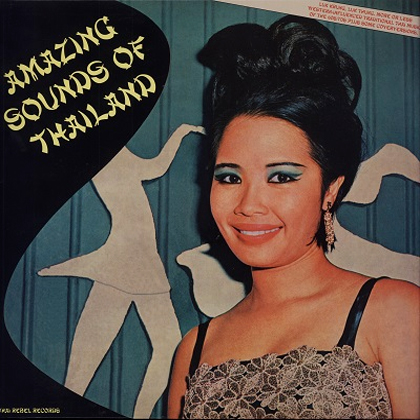
Listen To This
Thing Called Luk Thung
The most popular style of music in Thailand, luk thung is virtually unheard-of
in the United States, and I'd like to help the forces that are trying to change
that.
The genre got a boost in listenership a few years ago, when, to promo a bunch
of luk thung comps released at that time, Dangerous Minds helped
spread the word of Sroeng Santi's amazing cover of Black Sabbath's "Iron
Man (more about him later), but a handful of us already had a fondness for luk
thung decades prior, thanks to the Butthole Surfers' 1987 track "Kuntz"
(even more on that coming up as well).
The tribal music of Thailand villages, and folk singing, morphed into what is
traditionally known as luk thung in the 1930s. Though a term for it wasn't
coined until 1964, luk thung translates as "child of the fields",
as the lyrics were usually about the trials of the poor, sung in a soulful way,
and almost always carried a depressing tone of strife and tribulation.
While the term used to describe the music only becomes clear once its history
is revealed, no one is sure why it stuck. Most popular Thai artists of the time
were in love with American cinema, and many infused the sound of Hollywood soundtracks
into the mix, in an attempt to reach pop stardom, and break away from the Westerner's
view of the Thailandesi people as not much more than simple farmers. Yet, they
stuck with it, and, though sincere in their methods, they rode it for what it
was worth.

The godfather of
modern Luk Thung is Suraphol Sombatcharoen, who is dubbed the "King
of Luk Thung", as his 1952 song "Nam Da Sow Vienne" ("Tears
of a Lao Girl") sparked many Thai artists to pick up a crooning style to
rival Indonesian kroncong, or Japanese enka.
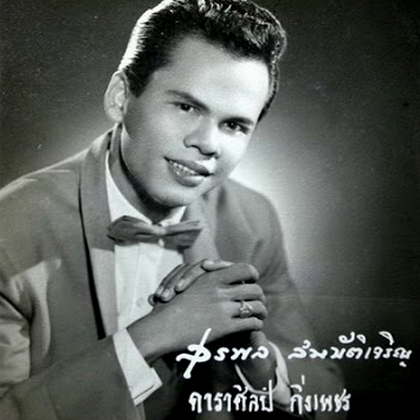
Sadly, Sombatcharoen
was killed as he was coming off stage in August of 1968 by a jealous husband.
The fusing of exotic
sounds by the artists of the time are best heard in Phongsi Woranut's early
work.
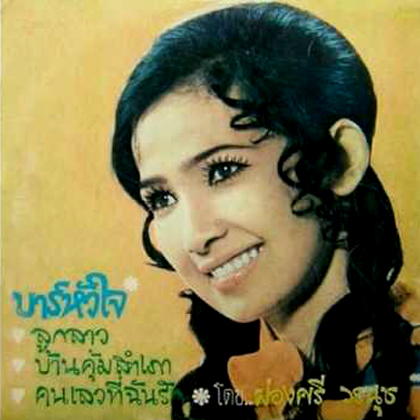
She was one of
the first few to step outside the traditional luk thung sound, and blend
Latin American, and American country music influences in the late 50s.
As the popularity
of U.S. films grew in Thailand, along came different styles of movies in the
late 60s and early 70s (such as gangster and Blaxploitation flicks), which had
the local up-n-comers blending rock, funk, and disco into the mix that would
hit their charts in an extreme way decades later.
One of the currently best-known (to Westerners) is the previously mentioned
Sroeng Santi, thanks to inclusions in almost every luk thung compilation
out in the last few years, as well as the blogosphere picking up on his version
of "Iron Man".
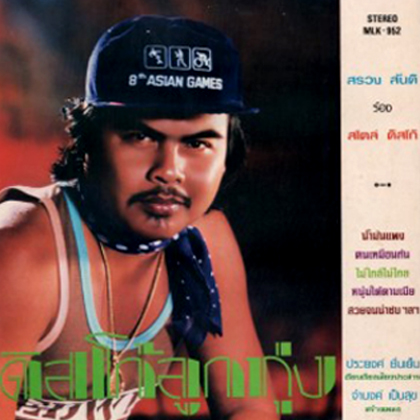
He died in 1982,
but weaved in every style of music he came across before his passing.
He had a disco phase.
A phase where he
must have wanted to score Spaghetti Westerns.
He fell into syrupy
R&B for a while…
…but also
left some of the most blistering rock to snake its way into the genre.
There were a handful
of other artists who, in the 1970s, also successfully mingled in new styles
that captured the ears of the locals.
Buppah Saichol had the surf sounds down.
Dao Bandon got
his funk on.
While Praiwan Lukpetch
had some soul hits.
Phloen Phromdaen
liked the sound of early Thai music, but opted to change the lyrical content,
while still singing in the traditional style.
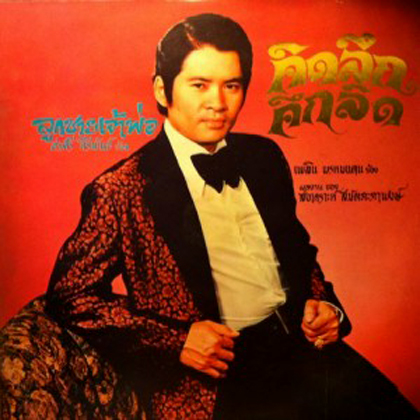
He is considered
one of the first to inject comedy into the typically somber mood of luk thung.
It figures it would
take a funnyman to find an odd place in punk rock history. As it turned out,
Gibby Haynes came across Phromdaen's "Klua Duang" (featured above)
on a bootleg cassette of Thai artists, titled Thai Shotgun Cassette.
He loved that song enough to remix it as a track on the Butthole Surfers' album
Locust Abortion Technician.
While he thought
it funny because it kept repeating the word "cunt", and titled the
reworking "Kuntz", he was unaware that it meant "itch".
The song is about a guy who goes to his local shaman to stop from scratching
himself all over, only to be told he has ringworm.
In the early 70s, a new form of luk thung emerged, called phleng phuea
chiwit (meaning: "Songs for Life"). It kept the singing style
of traditional luk thung, but had more political lyrics. By the late
70s, most of the scene, and its biggest band, Caravan, were influenced more
by psychedelic rock jams, and the democracy movement. One of which the fans
could stand, the other, the government tried to put a stop to. A few of Caravan's
members were witnesses to the Thammasat University Massacre of 6 October 1976,
and fled to Laos.
Caravan returned
in the mid-80s as a full rock band, and are still around today.
Even with all the musical mash-ups up until the 1980s, no one expected what
was to come.
With synth-pop spilling out of Mtv, and Britain's New Romantic invasion all
the rage, Thailand had a new style to merge in, making up "electronic luk
thung", along with a new pop megastar, Pumpuang Duangjan, who was simply
known as Pueng (meaning "Bee").
She first rose
to fame in 1983, with her first LP, Grasshopper Tie a Bow, and released
two more albums, before she began to concentrate mainly on acting.
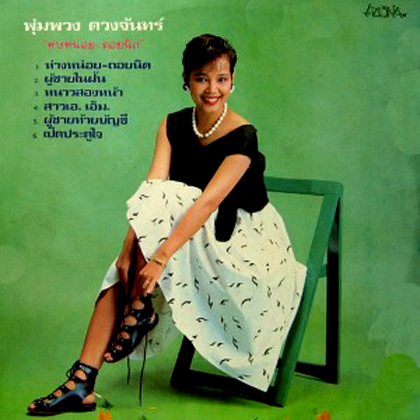
Though she made
millions, her funds were doled out by her stingy manager, and was unable to
pay for health checkups, leading to her death in 1992 from a blood disorder.
Her managers still profit, as most of her CDs released since her death were
compiled from recordings thought to not be good enough for a proper record.
After Pueng's passing, most of Thailand thought luk thung would die out
with her. As far as hit power was concerned, it did for a while, until the mid-90s,
when a new genre called luk thung isan (aka luk thung prayuk)
started blending the fast rhythms of Laotian mor lam.
While it produced a star in Latsamee Poodindong…
…it never
recaptured the amazing spirit of what Thailand wrote when it was first trying
to prove to the world, through music, that urbanization had indeed come to their
land.
One might think the classic luk thung sound has retaken Thailand, when
hearing Limousines' track "Luk Thung" come up first on internet searches.
That is, until
you do your research, and find they're a bunch of white jazz guys playing pretend
somewhere in Europe. I do hand it to them, as they have the sound down pat.
Still, there are a lot of compilations out there which rediscovered that time
once lost, and I recommend you search for them now, before this music goes back
to being completely unnoticed by the West, and lost to us again.
A. Souto, 2015
BACK TO MUSICA OBSCURA ARTICLE LIST